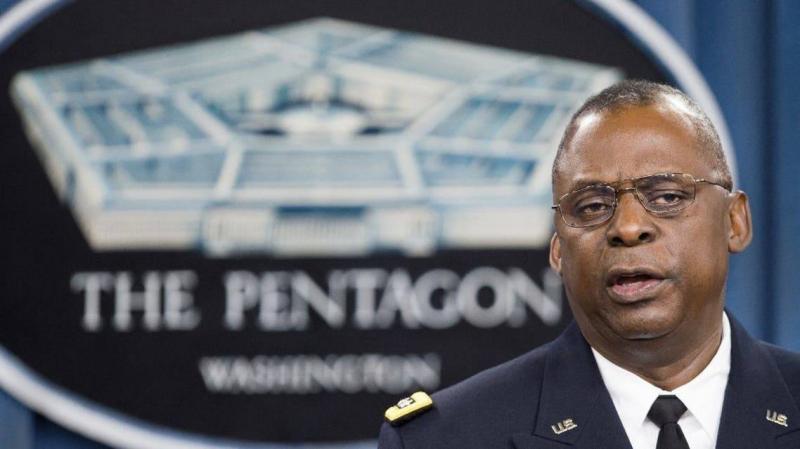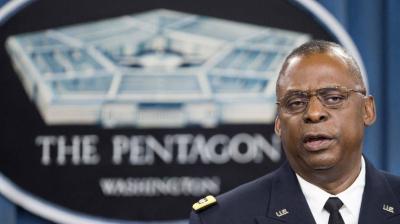The Biden administration will announce its security policy towards the Middle East in a speech by Secretary of Defense Lloyd Austin during his participation in the Bahrain Dialogue Conference. This policy is based on the principles of "determination, commitment, and cooperation." Lloyd Austin is the first senior member of the Biden administration to address its policy in the region with a comprehensive approach. Americans understand that there are many questions regarding the President's commitments to partners, friends, and allies in the region, and a senior official at the U.S. Department of Defense sought to preface this "announcement speech" by speaking to journalists concerned with the Middle East and Gulf security, requesting anonymity.
**Americans Are Staying**
The senior official acknowledged in his conversation with journalists, including Al Arabiya and Al Hadath, that "there are many questions in the region regarding U.S. engagement and the return to negotiations with Iran, as well as discussions about the distribution of U.S. forces worldwide and the United States' commitment to the region." Therefore, the secretary will confirm that the U.S. "maintains tens of thousands of troops in many military bases in the region." In a notable statement, the official clarified that Secretary Austin will assert that the United States "is working hard to keep its forces in Iraq and Syria on a mission to help fight ISIS."
It is clear that the Biden administration has heard many voices in the Middle East questioning its "determination and commitment" and is now trying to reassure these friendly parties that it has specific theories to follow up on its commitment in the region. This theory posits that "the United States is a global power and needs to adjust the map of its troop deployments and is capable of rapidly redeploying and exerting power."
**Beyond Hardware and Soldiers**
The U.S. commitment does not solely hinge on the military hardware present in the region, some of which is being transferred out, such as Patriot missile and aircraft defense batteries. The official mentioned the "volume of military sales, training, joint exercises, and Middle Eastern students studying at American military colleges, as well as capabilities for developing military capacities in the Central Command area." The U.S. commitment extends beyond just the deployment of forces.
The issue of U.S. military deployment in the Middle East has raised extensive discussions for decades. With each new U.S. administration, the Department of Defense reviews this deployment. Every U.S. administration since the early 1990s has reiterated its desire to reduce troop numbers while at the same time committing to a high level of military capabilities, especially in the Arabian Gulf.
Notably, under President Biden's administration, key figures like current Secretary of State Antony Blinken indicated even before Biden took office that the U.S. is not very interested in the Middle East, which signaled a repetition of President Obama's experience of pivoting east toward the Pacific and confronting China while leaving the Middle East.
**A "Smart" Means**
Now, the Biden administration wants to assert that there are two necessities, not one: addressing the rising Chinese threat while simultaneously retaining forces in the Middle East and finding a "smart" way to confront Iranian security threats. Military officials, like General Frank McKenzie, commander of Central Command, do not hesitate to reiterate this threat. The last instance was on Thursday, the 17th of this month, at the American-Arab National Relations Council conference in Washington.
The official spoke to journalists about this matter and stated that the region faces "many cross-border risks," considering that these risks cannot be addressed unilaterally or bilaterally, such as COVID-19, the climate crisis, attacks from Iranian drones, unsafe actions in international waters, and the refugee crisis stemming from ISIS's actions. Secretary Lloyd Austin will emphasize "cooperation and multilateralism" and call for "more cooperation and joint action at various levels to face and mitigate 21st-century challenges."
**Strength Not "Deterrence"**
What is largely absent from the current administration's language is the concept of "deterrence." The Biden administration appears to avoid using the term in its dealings with the Middle East and Iranian threats. The U.S. defense official, when asked about this subject, stated that Secretary Austin previously indicated that his principle of deterrence is based on all operational platforms and collaboration among all military forces. The official added that "the principle of deterrence applies to Iran, as the Iranians are not seeking to provoke a conventional confrontation with us; they would lose." He continued, "They resort to cheap techniques that can evade responsibility and exert pressure on the U.S. and its partners to create divisions among us." He provided examples of Iran arming militias, financing terrorist organizations, and attacking U.S.-friendly nations.
**"No Military Solution"**
Furthermore, the U.S. defense official stated, "There is no military solution to this," referring to the issues brought by Iranian threats and its militias. This statement contrasts sharply with the approach of the previous U.S. administration under Donald Trump, which declared that any attacks by Iran-aligned militias would be met with force, and considered that any such attacks would hold Iran accountable and lead to direct retaliation. In contrast, the Biden administration now claims it is working to prevent Iran from hiding behind the actions of its militias. The U.S. defense official concluded, "The issue does not relate to security groups and the network of threats, but rather to corruption, ethnic cleansing, and everything that follows Iranian influence."




